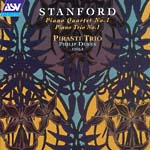Although he was one of the leading British composers of the 19th century, Charles Villiers Stanford (1852-1924) received his musical training in Germany–so it’s no surprise that both works on this disc come with Brahmsian credentials. Piano Quartet No. 1’s Allegro con brio first movement calls to mind the surging motion of Brahms’ own Op. 60 Piano Quartet. However, Stanford’s style of harmonic progression also suggests that of Schubert, something that won him much praise from Hans von Bülow and other German musicians. Accordingly, the work is tightly constructed and features consistently distinguished part-writing. Most impressive is the Poco adagio third movement, with its entrancing cello melody.
Composed 10 years after the quartet, Stanford’s 1889 Piano Trio No. 1 still bears traces of Brahms’ influence (the main theme is easily reminiscent of that composer’s A major Violin sonata), but Stanford speaks with his own voice as well, displaying remarkable ingenuity in the expansive Tempo di menuetto with its wonderfully fetching main theme interrupted by two crafty trios. Whatever the pedigree, both compositions are thoroughly enjoyable, especially as presented by the Pirasti Trio in its joyous, finely polished performances. ASV accords the group warm, natural sound. However, a glitch in the CD mastering has each track starting just before 0:00 (quite annoying when trying to cue up an individual track).
































